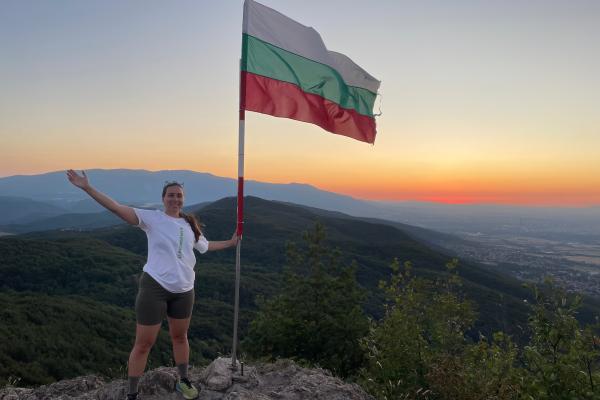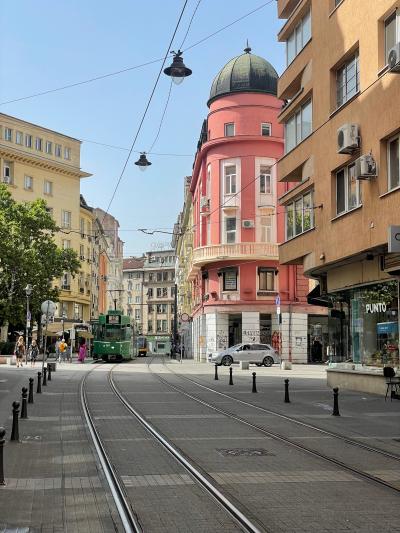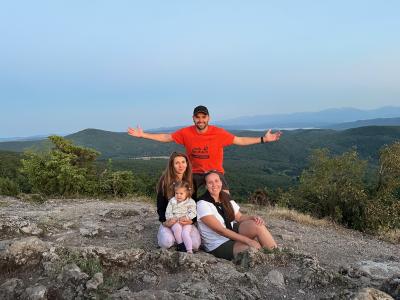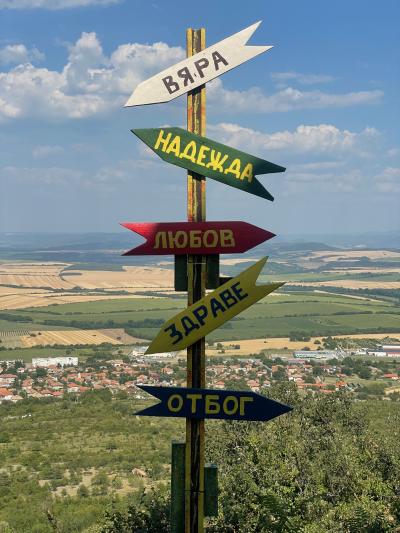From the FLAS Fellows: Siobhán Seigne's Summer in Bulgaria

Written by Siobhán Seigne, Summer 2024 FLAS Fellow for intermediate Bulgarian. Siobhán is a PhD student in the Department of Slavic and East European Languages and Cultures and participated in the American Councils Balkan Language Initiative in Sofia, Bulgaria.
The choice of how to spend your summer in graduate school (and during undergrad) can feel like an overwhelming decision. As the time to plan for each new summer rolls around (why does it come earlier and earlier each year?!) I usually feel pulled in many different directions: I debate getting a job to gain work experience or I consider applying to grants to allow me to work on my research.
Last year, when I was thinking about the summer, I decided that none of my current projects needed additional research in an archive or time abroad. I hadn’t started working with students as a Graduate Teaching Associate yet and therefore didn’t feel qualified to apply to summer teaching jobs. Instead, in conversation with my advisor we thought it would be a good idea to enroll in an intensive language program. Thinking ahead to writing my dissertation, I knew it would be helpful to have working proficiency in at least two other Slavic languages besides Russian.

So, earlier this year I decided to add Bulgarian to my languages of study (I also took Bosnian, Serbian Croatian at Ohio State for two years.) I set a goal of reaching novice-high/intermediate-low before the end of the spring semester so that I would qualify for a summer Foreign Language and Area Studies (FLAS) fellowship to help fund a study abroad program. It wasn’t too difficult to find a series of pre-rerecorded lectures on YouTube that walked students through a novice Bulgarian textbook and by dedicating an average of one hour of self-study a week, after 20 weeks (accumulating about 22.5 hours) I tested at intermediate-mid during my pre-program Oral Proficiency Interview (OPI.)
I chose the American Council’s Balkan Language Institute (BLI), an intensive and immersive language program because it promised the best results for the shortest amount of time. As the name indicates, these programs take place all over the Balkans, including Albania, Bosnia & Herzegovina, Bulgaria, Montenegro, North Macedonia, and Serbia. Students decide on a country based on their target language and in my case, the Bulgarian language program took place in the capital city of Bulgaria, Sofia.
American Councils’ programs are known for their intensity and rigor. For 2 months I met individually with a Bulgarian instructor for 3 hours a day, 5 days a week. In addition to class, I also had weekly excursions to cultural sites around Sofia. Another benefit was the home stay, and I credit most of my language gains to spending time with my host family every evening and each weekend. In the span of eight weeks, I was able to increase my proficiency level from intermediate-mid to advanced low.

Importantly, I’ll note that while I was living in Bulgaria, I did not feel like I had advanced-low proficiency in Bulgarian. Most of the time, I was overjoyed if I was able to order my morning coffee without the barista switching to English. Before my program started, I felt a false sense of confidence because as a Russian speaker I could decipher written Bulgarian. I was unprepared for how different the languages sounded spoken. When my host family first picked me up, I could barely understand them. About a week into the program though, I was starting to understand more and was even able to engage a little in Bulgarian too. If I had stayed longer than two months, I think my confidence in my spoken Bulgarian would have started to catch up to my reading and listening skills. I credit my success during my post-program OPI to the fact that it was an isolated testing situation that took place over the phone in a low-stress environment. When I was free from the anxiety of using Bulgarian as a necessity in Bulgaria, I was able to produce a strong performance.
In retrospect, my choice to use last summer to learn Bulgarian was a good one. My proficiency level could never have advanced so quickly without those two months of learning in an immersive environment. I benefited both from the relative freedom I have during the summer to study abroad and from applying for the ample sources of funding that are available for such endeavors, such as the FLAS fellowship. Amidst the pressures to advance research and gain work experience, I encourage students to also consider the significant language gains that can be made in just a few months.

Applications for summer 2025 and academic year 2025-26 FLAS funding will open November 1, 2024. To learn more about this opportunity, click the link below.
